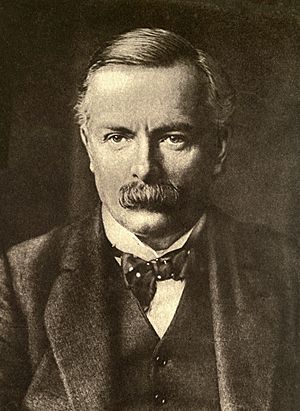Minister of Munitions facts for kids
The Minister of Munitions was an important job in the British government during the First World War. This person was in charge of making sure Britain had enough weapons, bullets, and bombs (called munitions) for the war.
This role was created because of something called the Shell Crisis of 1915. People were worried because newspapers reported that the army didn't have enough artillery shells. There were also fears of people trying to stop the production. So, on July 2, 1915, the government passed the Munitions of War Act 1915 to make sure the army got the supplies it needed.
Under the strong leadership of a politician named David Lloyd George, the Ministry of Munitions quickly got to work. In its first year, it helped solve problems between workers and bosses. It also made sure Britain could produce a huge amount of munitions very quickly.
A historian named J. A. R. Marriott explained the government's plan:
- No private interest was to be permitted to obstruct the service, or imperil the safety, of the State. Trade Union regulations must be suspended; employers' profits must be limited, skilled men must fight, if not in the trenches, in the factories; man-power must be economized by the dilution of labour and the employment of women; private factories must pass under the control of the State, and new national factories be set up. Results justified the new policy: the output was prodigious; the goods were at last delivered.
This meant that nothing, not even private businesses or old rules, could stop the war effort. Worker rules were put on hold, company profits were limited, and skilled workers were needed in factories. More women were hired to help, and the government took control of factories to make sure enough supplies were made. This new approach worked, and a huge amount of goods were produced.
Contents
Why the Ministry of Munitions Was Needed
David Lloyd George became very famous for his hard work as the Minister of Munitions from 1915 to 1916. This job helped him become a very important political leader later on.
When the Shell Crisis of 1915 happened, people were upset because the army was running out of artillery ammunition. Everyone wanted a strong leader to take charge of making more weapons. In May 1915, a new government was formed, and Lloyd George was chosen to lead the new Ministry of Munitions to fix the shortage.
How the Ministry Helped the War Effort
As Minister, David Lloyd George helped solve arguments between workers and factory owners, especially in an area called the Clyde. These arguments were often about lowering wages or using less skilled workers. He also asked for an investigation into how munitions workers were treated. This led to his Ministry taking over services that gathered information about workers.
Lloyd George was praised for greatly increasing the production of munitions. Many people believe this helped him become Prime Minister in late 1916. While some historians say that many improvements were already planned before he arrived, most agree that he boosted national spirit. He also made everyone focus on the urgent need to produce more.
An American historian, R. J. Q. Adams, showed that the Ministry of Munitions cut through slow government processes. It solved problems with workers, made the supply system more organized, and greatly increased production. Within just one year, it became the biggest buyer, seller, and employer in Britain.
To make things better for workers and improve public opinion, the Ministry created a department focused on workers' well-being. This department improved first aid in factories and promoted safety. It also dealt with health problems caused by dangerous chemicals like TNT. They even provided daycare for children, limited overtime hours, and sometimes helped workers with transportation and housing.
Who Worked for the Ministry
The Ministry was led by senior army officers and business people. These experts were loaned from their companies to help during the war. They were able to work with big businesses and the government to agree on fair prices and profits.
Government agents also bought important supplies from other countries. Once bought, the Ministry controlled how these supplies were given out. This stopped prices from going up too much and allowed normal trade to continue. For example, the entire jute crop from India was bought and distributed this way. Other materials like steel, wool, leather, and flax were also controlled.
By 1918, the Ministry had 65,000 staff members. It employed about 3 million workers in over 20,000 factories. Many women, new to engineering work, joined the workforce during the war. The Ministry was closed down in 1921. This was part of a plan to reduce government spending after the war ended with the Armistice in 1918.
Ministers of Munitions, 1915–1921
| Name | Party | Entered office | Left office | |
|---|---|---|---|---|
| David Lloyd George | Liberal Party | 25 May 1915 | 9 July 1916 | |
| Edwin Montagu | 9 July 1916 | 10 December 1916 | ||
| Christopher Addison | 10 December 1916 | 17 July 1917 | ||
| Winston Churchill | 17 July 1917 | 10 January 1919 | ||
| Lord Inverforth | 10 January 1919 | 21 March 1921 |
See also
- UK Embargo strike (1918)
Primary sources
- Lloyd George, David. War Memoirs (2nd ed. 1934) volume 1 chapter 9. 19


